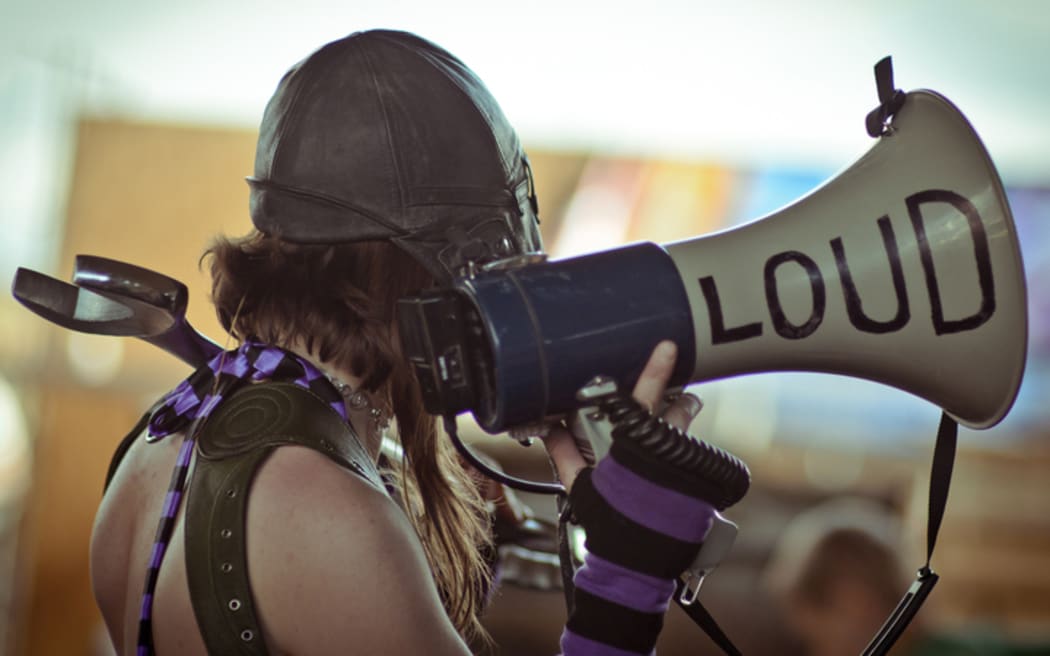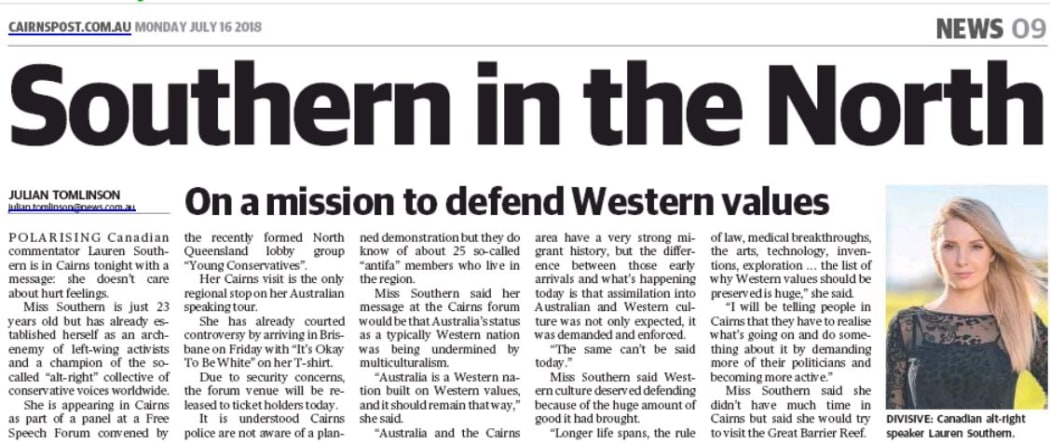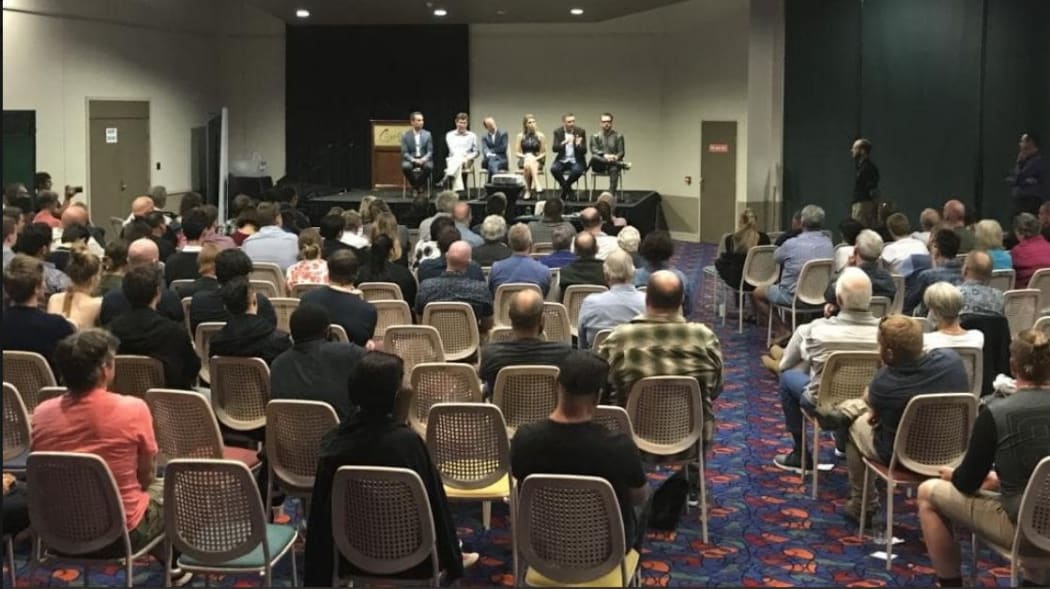Two online provocateurs from Canada sparked a debate about free speech and hate speech here without ever setting foot in the country or saying anything meaningful about New Zealand.

Photo: Sharkhats/Flickr
This week Auckland mayor Phil Goff backed a bold but controversial idea for Auckland - a sculpture described as a local version of the Statue of Liberty.
But last weekend Mr Goff was getting curly questions from the media about just what sort of liberties he was prepared to allow in his city.
He also backed the decision not to allow Canadian new media provocateurs Lauren Southern and Stefan Molyneux to speak at a council-owned theatre in Takapuna.
That was supposed to be part of their Australasian tour spreading the word about what they see as immigration and multiculturalism harming what they regard as western civilisations.
Their promoters cancelled their visit here altogether, insisting it was too late to find another suitable venue.
Lauren Southern told Australian News Corp columnist Miranda Devine the New Zealand government was trying to obstruct them, though their visas were approved on Friday and it was only Auckland Council premises unavailable to them.
But without saying another word about New Zealand they got plenty of profile in our media.
The Dominion Post called the pair “provocateurs looking for a reaction to justify their pretence of victimhood”.
On TVNZ 1’s Q+A, host Corin Dann said Phil Goff had amplified the grievances of Lauren Southern and Stefan Molyneux by pulling the plug on their premises.
This week’s Listener magazine canvassed views about the line between hate speech and free speech over ten pages. The Listener followed up with a few more in the edition for the coming week - all about the laws other countries have to deal with the issue.
The Free Speech Coalition - a hastily-formed group that raised $50,000 in little more than a day - created even more headlines.
The group's QC has filed for a judicial review to to challenge Auckland Council’s decision and try to establish a precedent to free up public spaces for free speech.
Its spokesperson Don Brash told RNZ's Morning Report he would defend the Canadians' right to air their views here - even though he was not exactly sure what those views were.
When Guyon Espiner filled him in on Stefan Molyneux’s views on ethnicity and intelligence, Dr Brash said he didn't agree with them but conceded he was effectively supporting Molyneux's right to be racist here in New Zealand because he was close to “an absolutist” on free speech.
Success and ethnicity is something Dr Brash has gone public on before.
“Some racial groups - for genetic or cultural reasons - appear to be very much more successful than other groups,” he wrote in his self-published 2014 autobiography Incredible Luck.
In the book he said he didn't know if genetic advantage played a part or not. In the end, he wrote, "only the outcomes really matter".
With that in mind, it seems bizarre Dr Brash put his weight behind a campaign to allow someone to air views others have condemned as racist, but showed no interest in finding out why.

Lauren Southern was big news in northern Queensland where she made the first appearance of her controversial tour. Photo: screenshot
Alongside Dr Brash on the Free Speech Coalition was a veteran voice of the political left, Chris Trotter, who suggested an alternative platform for the visitors.
"Imagine if the Q+A programme had set aside an entire hour for a televised debate between Molyneux and Southern, representing the Alt-Right; and two representatives of the New Zealand Left. Annette Sykes and John Minto spring to mind," he wrote on his blog.
"For 60 minutes, New Zealanders could have heard debated the ideas and causes that are currently driving global politics," he said.
In any media interviews or articles Mediawatch could find online featuring the Canadians under scrutiny, they really don't articulate what Chris Trotter called “the ideas and causes that are currently driving global politics”.
"Alternatively, TVNZ could have set up one of its live 'town-hall meetings' at which a broad cross-section of Kiwis could have asked questions of the two right-wing provocateurs," Chris Trotter added
That would go further than accommodating their free speech rights. It would privilege their views to an extent no-one else has enjoyed on TV here for years - unless there’s an election on.
On The Project on Three last week, Trotter acknowledged free speech had limits. When told that Southern had actively obstructed the seaborne rescue of migrants in Italy, he was not sure that was true.
In the Timaru Herald, columnist Grant Shimmin had no trouble finding out.
"I just watched on YouTube a recording of a live stream by Southern as she and right-wing European activists attempted - using flares - to stop a boat carrying asylum-seekers from Africa reaching Sicily in March 2017," he wrote.
Grant Shimmin went on to point out New Zealanders who really want to hear Southern and Molyneux's views can easily do so online. Or indeed in public, if the pair hire another hall and make the trip from Australia now they have their visas.
On Friday this week, The New Zealand Herald backed mayor Phil Goff.
"These days all viewpoints can be found online. But not all of them have a right to room on other platforms that try to serve the public interest," the paper said.
The Herald compared the Auckland mayor’s position with that of a newspaper editor. Both need to give people a fair hearing before barring them from public halls or websites or newspaper pages after considered and reasonable research, the Herald said.
But for news media - said the Herald’s editorial - the challenging views being put forward also have to be interesting.
Last Monday, Lauren Southern addressed a Young Conservatives North Queensland free speech forum in Cairns - where the local News Ltd paper the Cairns Post had reported on her every day since she arrived in town.
But there was no report of that event in the paper - or anywhere else.
What was discussed?
“There is a groundswell of concern about keeping our free culture, the LGBTIQ war on children’s gender - and electricity prices,” said the the MC of the event - Australian Conservatives political party candidate Lyle Shelton - on his Facebook page.
The North American alt-right take on Queensland’s energy prices seems to have gone unreported - and pictures on Twitter show only a modest crowd and plenty of empty seats.

Lauren Southern's first speaking engagement in Australia was sparsely attended in spite of heavy media coverage in advance. Photo: Twitter
After Friday’s engagement in Melbourne, which was disrupted by protests, nothing that was said onstage made news that night or the papers the following day.
Last weekend, reporter Annabel Hennessy from Sydney’s Daily Telegraph said interviewing Southern was “a waste of my time”.
“Just like there are some people who can’t be argued with, there are some who can’t be interviewed," she wrote.
"I spent 13 minutes interviewing Southern on the phone and it was a fruitless task, because her whole rhetoric is designed to create a reaction rather than examining individual issues.”
In the end, whether Southern is good media talent or not isn't an issue for those sticking up for her free speech rights here.
It seems the fact a local politician had say-so on the availability of the preferred premises was a bigger deal for them than Southern's or Molyneux's ideas - or the backdrop of an international 'culture war'.
Given media outlets here and in Australia wrote far more about the pair before they arrived and started speaking, the Canadian provocateurs probably aren't bothered.
Southern and Molyneux probably know that in the end it's not local authorities' policies on their venues that might strangle the spread of their ideas, it's the news media that has the power to put them in front of an audience that doesn’t already subscribe to their views - or their YouTube channel.

